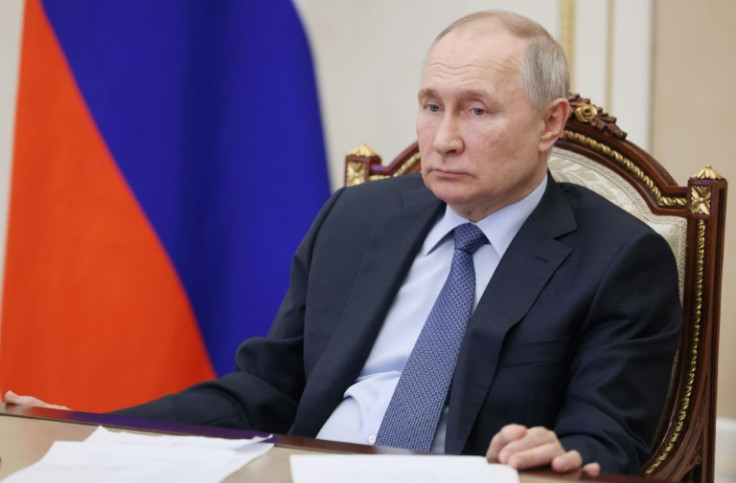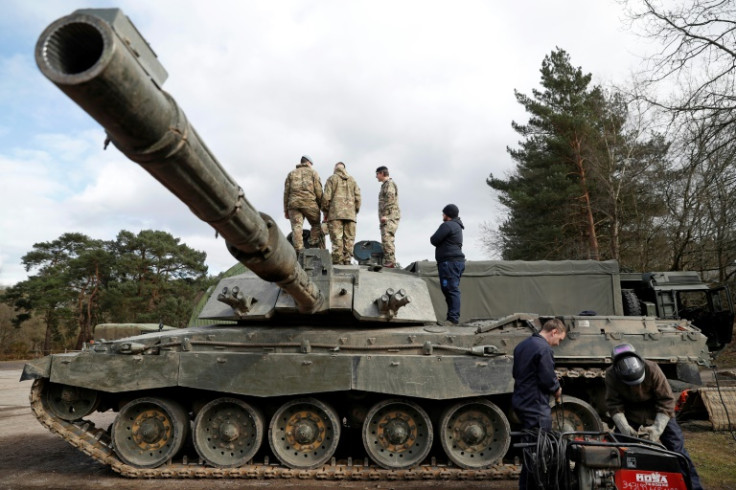Putin Outraged Over Ukraine's 'Nuclear Component' Ammo Which Russia Has Been Using Since 2018

KEY POINTS
- Russia accused the West of using a nuclear component to support Ukraine
- U.K. Defense Ministry called Putin's remarks disinformation
- Russia's T-80BVM tanks have been using depleted uranium shells since 2018
The U.K.'s plan of supplying Ukraine with armor-piercing depleted uranium shells angered Russian President Vladimir Putin.
"If all this happens, Russia will have to respond accordingly, given that the West collectively is already beginning to use weapons with a nuclear component," Putin said, Russian independent news outlet The Insider reported.
Other Russian officials, including Foreign Minister Sergey Lavrov, Defense Minister Sergei Shoigu, and State Duma Speaker Vyacheslav Volodin, echoed Putin's veiled threats.
Belarusian President Alexander Lukashenko also stood with Putin over the U.K.'s move to send depleted uranium shells to the beleaguered country.
However, a spokesperson for the U.K. Ministry of Defense called Putin's statement calling the shells as a nuclear component a "disinformation."
"The British Army has used depleted uranium in its armor-piercing shells for decades. It is a standard component and has nothing to do with nuclear weapons or capabilities. Russia knows this but is deliberately trying to disinform," the U.K. defense spokesperson said.
Retired British Colonel Hamish de Bretton-Gordon, a chemical weapons expert, also dismissed Putin's remarks.
In an interview with Sky News, de Bretton-Gordon said Putin wanted to "persuade [Chinese] President Xi [Jinping] to give him weapons and to terrify people in the West."
The independent Russian outlet also pointed out that the Russian military's 3BM60 "Svinets-2" anti-tank shells have depleted uranium.
The Russian T-80BVM tanks were also equipped with depleted uranium shells, as announced by the Russian Defense Ministry in 2018. They were also used by Russia in its war in Ukraine.
According to the International Atomic Energy Agency (IAEA), depleted uranium is less radioactive than natural uranium.
IAEA also explained why depleted uranium is preferred as an armor-piercing agent for anti-tank shells.
"Depleted uranium is preferred to other metals, because of its high density, its pyrophoric nature (DU self-ignites when exposed to temperatures of 600° to 700° and high pressures), and its property of becoming sharper, through adiabatic shearing, as it penetrates armor plating," the IAEA said.
A 2018 report by the office of the U.N. Secretary-General has also insisted that depleted uranium does not pose a radioactive risk to humans, saying it's found in soils, vegetables, water and surfaces.
The depleted uranium is also not classified as a nuclear weapon or banned under international conventions due to its low radioactivity.
Last week, U.K. Minister of State for Defense Annabel Goldie confirmed during a parliamentary hearing that the country would provide depleted uranium shells and send a squadron of Challenger 2 main battle tanks to Ukraine.
Goldie said the shells are "highly effective in defeating modern tanks and armored vehicles."

© Copyright IBTimes 2025. All rights reserved.





















